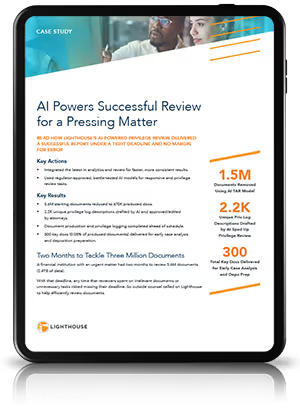
AI at Lighthouse
Powering Future-Ready eDiscovery
From the earliest days, our commitment to maximize value for our customers through innovation and the application of technology has never wavered. This commitment led us to begin developing our first large language model (LLM)-based solution in 2018 and positioned us as the market leader in predictive AI analytics for eDiscovery.
Now we’ve combined both predictive and generative AI with unrivaled eDiscovery expertise to power human-in-the-loop AI solutions for the largest, most complex data challenges facing our industry.


Predictive + Generative AI Purpose Fit for Large, Complex Litigation
Rapidly, accurately, and confidently conquer massive volumes and tight timelines with expert-driven AI. Each Lighthouse AI solution was created to solve our clients' most pressing challenges from accurately identifying toxic communications to streamlining privilege review.
A Principled, Participatory Approach
At Lighthouse we do not view AI as a replacement for people, but rather as a powerful instrument to enhance human potential. This belief is reflected in the four pillars of our AI approach:
Human-AI Collaboration
We put clients at the center of our approach ensuring the purpose of our solutions reflect their needs and mitigating over-reliance on abstraction in solution design.
Security & Privacy
We proactively design solutions to uphold the integrity, confidentiality, and security of sensitive data in every aspect and at every step in the process.
Scale & Efficiency
We focus on applying technology that is fit for purpose to maximize impact and mitigate costs without introducing increased risk.
Trust & Transparency
We believe scalable adoption requires people to manage and quality-control the process to avoid risks like over-automation, unintended bias, and hallucinations.
Explicitly, our commitment to a principled, participatory approach is captured in our AI Promise to Customers.
Proven Record: Transforming eDiscovery with AI
After launching our first AI-based classifier built with LLMs in 2019, we continued to expand our suite of AI solutions to include classifiers for PII/PHI, “Junk” Detection, Toxic Language, and Source Code, as well as Portfolio Analytics capabilities.
With the addition of generative pre-trained transformers (GPT) we started incorporating generative AI and launched a first to market GenAI privilege log solution in January 2024. The expanded adoption of enterprise AI productivity tools led us to add a second category to our AI practice—solutions to help customers implement GenAI technologies in a compliant, eDiscovery friendly manner.

eDiscovery Innovation
Proprietary predictive and generative AI transforms how you find, understand, and interpret your data.
Compliance & Governance
Experts help you understand the eDiscovery impact of enterprise AI adoption and mitigate related risks.
See It in Action
Take a deeper dive into our AI for Privilege solutions in our interactive prototype.

State of AI in eDiscovery Report
Get the latest on how professionals like you are using AI for eDiscovery, including hurdles to adoption and concerns about the ramifications in data governance and litigation.
FAQs
What are large language models?
Large language models are a subset of AI that analyze data as human language. Without LLMs, AI simply treats words as data points, instead of an interconnected set of data. This is especially critical in eDiscovery, where accurately analyzing large volumes of documents is a key deliverable and part of risk mitigation.
Is Lighthouse using ChatGPT?
No; we are not using ChatGPT, but we are using GPT models. We currently use predictive and generative AI in our analytic workflows and are continuing to evaluate use cases in other parts of the eDiscovery lifecycle.
What is the Lighthouse AI approach to protecting client data?
When clients use Lighthouse AI, Lighthouse will only use client data on their behalf, with their consent. These scenarios may include:
- Training AI classifiers for tailored models specific to client data
- Implementing, and running AI classifiers on client matters
- Using results from AI models for document review
Client data, including inputs, outputs, and training data are:
- NOT available to other Lighthouse clients
- NOT available to Microsoft or OpenAI
Case Studies
Get in Touch
Want to learn more about our AI-enhanced approach? Fill out the form and a team member will be back with you shortly.




